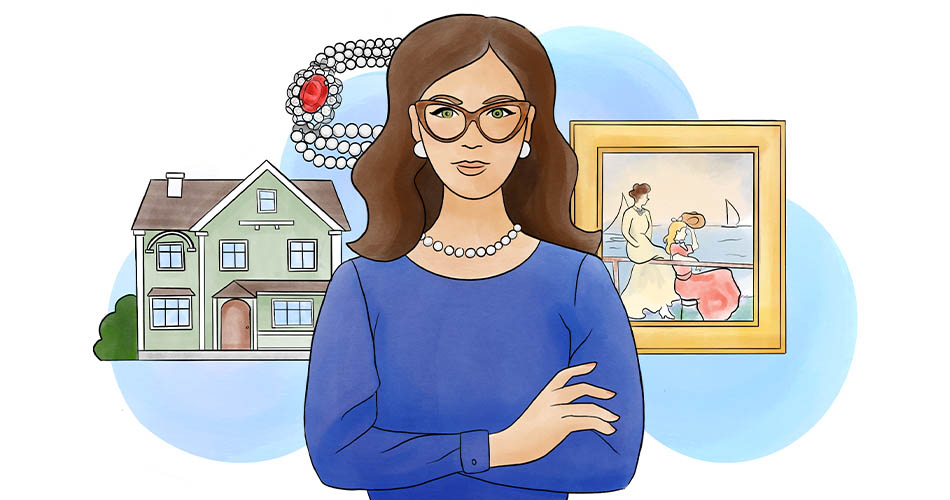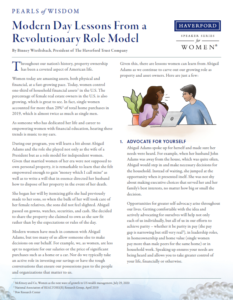By Binney Wietlisbach, President of The Haverford Trust Company
Throughout our nation’s history, property ownership has been a coveted aspect of American life.
Women today are amassing assets, both physical and financial, at a fast-growing pace. Today, women control one-third of household financial assets[1] in the U.S. The percentage of female real estate owners in the U.S. is also growing, which is great to see. In fact, single women accounted for more than 20%[2] of total home purchases in 2019, which is almost twice as much as single men.
As someone who has dedicated her career to empowering women with financial education, hearing these trends is music to my ears.
During our program, you will learn a bit about Abigail Adams and the role she played not only as the wife of a President but as a role model for independent women. Given that married women of her era were not supposed to own personal property, it is remarkable to learn that she felt empowered enough to gain “money which I call mine” as well as to write a will that in essence directed her husband how to dispose of her property in the event of her death.
She began her will by itemizing gifts she had previously made to her sons, so when the bulk of her will took care of her female relatives, the sons did not feel slighted. Abigail passed on gowns, watches, securities, and cash. She decided to share the property she claimed to own as she saw fit rather than by the expectations or rules of the day.
Modern women have much in common with Abigail Adams, but too many of us allow someone else to make decisions on our behalf. For example, we, as women, are less apt to negotiate for our salaries or the price of significant purchases such as a home or a car. Nor do we typically take an active role in investing our savings or have the tough conversations that ensure our possessions pass to the people and organizations that matter to us.
Given this, there are lessons women can learn from Abigail Adams as we continue to carve out our growing role as property and asset owners. Here are just a few:
- Advocate for yourself
Abigail Adams spoke up for herself and made sure her needs were heard. For example, when her husband John Adams was away from the house, which was quite often, Abigail would step in and make necessary decisions for the household. Instead of waiting, she jumped at the opportunity when it presented itself. She was not shy about making executive choices that served her and her family’s best interests, no matter how big or small the decision.
Opportunities for greater self-advocacy arise throughout our lives. Getting comfortable with the idea and actively advocating for ourselves will help not only each of us individually, but all of us in our efforts to achieve parity – whether it be parity in pay (the pay gap is narrowing but still very real[3]), in leadership roles, in homeownership and home value (single women pay more than male peers for the same home) or in household work. Speaking up will help ensure your needs are being heard and may allow you to take greater control of your life, financially or otherwise.
- Take an active role in investment conversations
In the late 1700s when most investors were using extra cash to purchase farmland, Abigail made the decision to invest in government bonds. After doing her research, she decided to invest in bonds to fight against rising inflation at the time. It was a very different interest rate environment than today, and her bond investment paid off handsomely, returning more than 400% on her original investment[4].
Throughout history, women have tended to stay on the financial sidelines more than men. When it comes to investing, it is estimated that only 51% of women[5] are invested in the stock market, compared to 74% of men. And while it’s estimated that by 2030 women will control two-thirds of the nation’s wealth[6], 90% of women feel financially illiterate[7] and many aren’t involved in their family’s finances beyond day-to-day budgeting.
Part of bridging this gap comes down to financial education and understanding the basics of finances and investing. Even if we prefer to have someone else manage our finances, having the foundational knowledge will put us in control of our financial futures.
- Prepare for the unexpected
Abigail Adams went to great lengths to ensure her assets were property accounted for in the event of her death. She outlined detailed reports explaining exactly where, how, and when to distribute her property. Death is an issue no one likes to discuss, but the importance of estate planning cannot be understated.
There are many things to consider when establishing an estate plan. Whether you are writing your own will like Abigail or helping a parent, spouse, or other loved ones to express their final wishes, professionals can help with tax implications and iron out exact instructions to ensure property will be distributed as expected. It is never too early to begin planning, but it can be too late.
Our stories are yet to be written
Abigail Adams was well ahead of her time and her story provides lessons for all of us today. Most importantly, Abigail understood her power as a woman to use what she could to transcend the forces against her. Women today are wise to continue this philosophy and use the tools at our disposal to make the most of our lives by advocating for ourselves, taking an active role in investing, and preparing for the unexpected.
As I am fond of saying, there are things we can control and those things that we cannot. Take the initiative and plan now for those things you can control.
[1] McKinsey and Co, Women as the next wave of growth in US wealth management, July 29, 2020
[2] National Association of REALTORS(R) Research Group, April 2019
[3] Pew Research Center
[4] Museum of American Finance
[5] Money Crashers
[6] Financial Facts for Women’s History Month – The Quantum Group[7] McKinsey & Company

